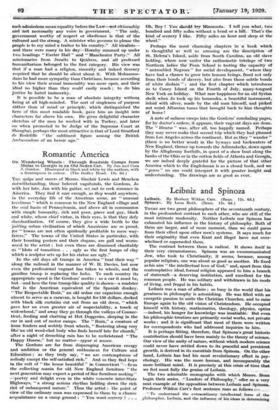Romantic America
On Wandering Wheels . Through Roadside Camps from Maine to Georgia in an Old Sedan Car. By Jan and Cora J. Gordon. Illustrated in black and white by the authors, with a frontispiece in colouk. (The. Bodley Head. 12s. 6d.)
Tim quips and sneers of Meisrs. Sinclair Lewis and Mencken notwithstanding, those beloved vagabonds, the Gordon, Jo with her lute, Jan with his guitar, set,oht to seek romance in
Ainerica. They find it sure enough, as they would anywhere, in the everyday life of the Arnerican scene; an " Unusual loveliness " which is common to the New England village and
the coal basin of Pennsylvania, and above all in communion With simple humanity, rich and poor, grave and gay, black and white, whose chief virtue, in their eyes, is that they defy standardization. Of course, they give a wide berth to the foaling urban Civilization of which Americans are so proud,
for "towns are not often spiritually profitable to mere way- farers." The towns Of the United States in particular, with their boosting posters and their slogans, are gall and -worm- wood to the artist ; but even these are dismissed charitably
as "blots of transition . . . ugly as the first lumps of clay Which a Sculptor sets up for his statue are ugly."
In the old days all tramps in America " beat their way " along the railroad in the manner of W. H.- Davies, but now even the professional vagrant has taken to wheels, and the gasoline trainp is replacing the hobo. To each country its
appropriate speed is the Gordon? motto ; so a ear it Must be, but=and here the true tramplike quality is shown—a roadster that is the Anierican equivalent of the Spanish donkey.
" The Respectable Ruin," an old sedan car capacimis enough almost 'to serve as. a caravan, is bought for 150 dollars, decked
With black silk curtains cut out from an old dress, " which gave her an even greater air of respectability, a touch of widowhood," and away they go through the valleys of Connec- ticut, feeding and chatting at Hot Doggeries, sleeping in the car in and out of motor camps. The " Ruin," a creature of loose fenders and wobbly front wheels, " flustering along very iikClin 'old weed-clad body who finds herself late for church,'
after a night of drenching rain has to be rechristened ".The Happy Hearse,". but no matter—eppur si muove.
The Gordons are far from disparaging American energy and ambition or the general enthusiasm for Culture and Education ;- as they truly say, " we are contemptuOua of nialtiodY except the self-satisfied rich." And so they find hope in. the cult of " the house beautiful" in Connecticut ."---frem the collecting mania for old New England furniture " the nekt generation may expect a period of fine furniture making -pOttiry and 'delight even in the white 'concrete inter-State Highways, " a strong serious rhythm holding down the rich riot of unhampered nature." . Thus the artist : the point of view of the ordinary man was expressed to thew by a chance acquaintance on a camp ground : ".You want scenery ? . . . Oh; Boy 1 You ahould try Minnesota. I tell you what, two hundred and fifty miles Without a bend or a bill. That's the kind of scenery I like. Fifty miles an hour and sleep at the Wheel." - - •
Perhaps the most charming chapters in a book which is thoughtful as well as amusing are the 'description . of St. Helena's Island, aside from South Carolina, an old slave holding, where now under the enthusiastic tutelage of two Northern kidied the Penh School is testing the eapacitY of " untroubled Negroes " for social development, "where they have had a chance to grow into human beings, freed not only from their biinds of slaverY, but also froni those subtle bonds of white disdain " : and the first chapter which introduces us to Coney Island on the Fourth of July, many-tongued New York on holiday. What rare happiness for an old Syrian sheik when Jo took up his bOuzoulca, a beautiful instrument, inlaid with silver, made by the old man himself, and picked out weird Albanian tunes that brought back to hini thoughts Of hoMe !
A note of sadness creeps into the Gordons' concluding pages, for by doctor's orders, it appears, their vagrant days are done. The " Hearse " was, after all, too happily named. Perhaps they may never make that second trip which they had planned from Los Angeles across the continent, But as they "wander " (there is no better word) in the byways and backwaters of New England, thence up towards the Adirondacks, down again by the Alleghenny foothills,in quest of a show boat along the banks of the Ohio or in the cotton fields of Atlanta and Georgia, we are indeed deeply grateful for the picture of that other America which to the Englishman is as a closed book, and we "guess ", no .one could interpret it with greater insight and understanding.. The drawings are as good as ever.






































 Previous page
Previous page